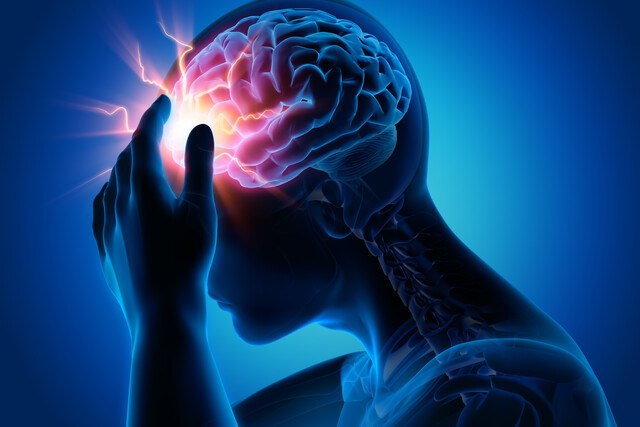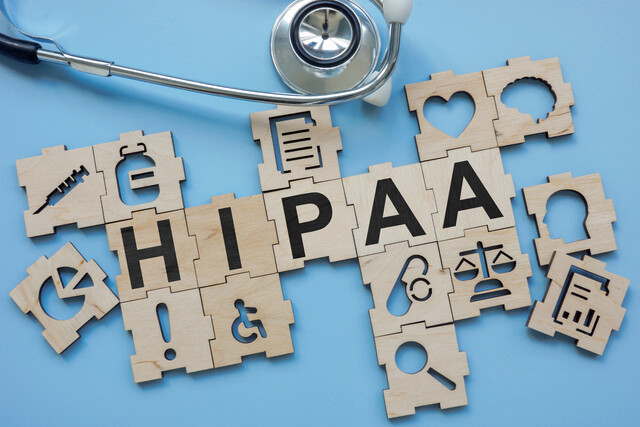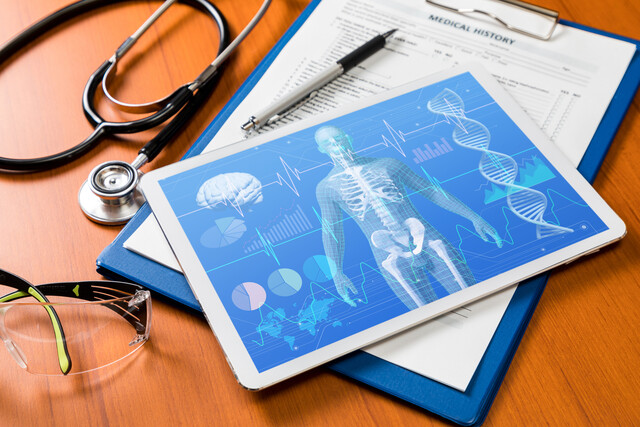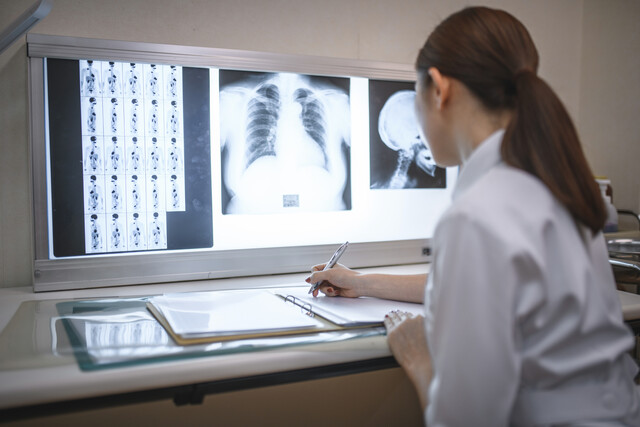Online Class: Medical Assistant Career Overview
Learn how to contribute effectively in a healthcare setting by pursuing a career as a medical assistant, where the satisfaction of patient care meets unprecedented growth opportunities. From x-ray assistance to physical therapy support, this course guides you in unlocking diverse paths within the healthcare industry.

Self-Paced, Online Class
Library Subscription
-
15Lessons
-
22Exams &
Assignments -
11Hours
average time -
1.1CEUs
Course Description
Medical assisting is a relatively new career choice, and it is a booming industry. With the current economic crisis, many health care providers are looking for talented and willing individuals to train with them as assistants to help them care for more patients each day. With the coming of senior citizen status for baby boomers, the opportunity to serve them is mushrooming.
Medical people range from the highly skilled physicians and surgeons, radiologists, clinical lab technologists and nurses to the less highly educated nurse's aides, and respiratory technicians. As a Medical Assistant you will be working as part of a medical team. There is no greater job satisfaction than helping others. If you can relieve a person of pain and anxiety, that is gratifying. If you are able to help diagnose a problem for the patient, this is self-satisfying. If you are able to ease the load of your fellow workers, that is a great feeling. This course will provide a wealth of information about this career path. You will learn how to increase opportunities to expand your skills and abilities. Pursuing this career path and you may be given the opportunity to learn how to become an x-ray assistant or a phlebotomist. There is also the possibility to branch out into the physical therapy assisting field or train to become a hemodialysis technician. The more you can do, the more value you will bring to the job, the more you will be able to help the patients under your care, and the more money you will make. This course will help you see your future in this booming industry and provide you with the information you'll need to be successful.
Course Lessons
Lesson 1. The Essentials of Medical Assisting
Medical assisting is a growing career offering a blend of administrative and clinical roles, providing lifelong learning opportunities. As an indispensable part of healthcare, medical assistants ensure efficient operations and compassionate patient care.
21 Total Points
 Review Practice Worksheet: Lesson-1-StudyGuide-19302.pdf
Review Practice Worksheet: Lesson-1-StudyGuide-19302.pdf Lesson discussions: Reasons for Taking this Course
Lesson discussions: Reasons for Taking this Course Complete Assignment: An Introduction
Complete Assignment: An Introduction Assessment: Lesson 1 Review Exam
Assessment: Lesson 1 Review Exam
Lesson 2. The Dynamic Role of Medical Assistants in Modern Healthcare
In the dynamic realm of medical assisting, individuals skillfully navigate between the clerical and the clinical, ensuring patients receive optimal care. Their roles are as diverse as they are essential, with specialization opportunities broadening their impact in various medical fields.
21 Total Points
 Review Practice Worksheet: Lesson-2-StudyGuide-19304.pdf
Review Practice Worksheet: Lesson-2-StudyGuide-19304.pdf Complete: Lesson 2 Activity
Complete: Lesson 2 Activity Assessment: Lesson 2 Review Exam
Assessment: Lesson 2 Review Exam
Lesson 3. Empathy: The Priceless Asset in Healthcare
Telephone communication in healthcare requires the precise use of tone and clarity, maintaining patient privacy and preventing misunderstandings. Healthcare workers must adeptly reassure and verify information over calls, ensuring accurate message delivery.
21 Total Points
 Review Practice Worksheet: Lesson-3-StudyGuide-19306.pdf
Review Practice Worksheet: Lesson-3-StudyGuide-19306.pdf Complete: Lesson 3 Activity
Complete: Lesson 3 Activity Assessment: Lesson 3 Review Exam
Assessment: Lesson 3 Review Exam
Lesson 4. The Emotional Tapestry of Patient Mortality
Healthcare providers navigate the complexities of mortality, blending medical care with compassion to support patients and families through life's final chapter. This journey involves honoring diverse responses to terminal diagnoses, empowering patient choices, and transcending basic medical duties to foster a dignified passage.
21 Total Points
 Review Practice Worksheet: Lesson-4-StudyGuide-19309.pdf
Review Practice Worksheet: Lesson-4-StudyGuide-19309.pdf Complete: Lesson 4 Activity
Complete: Lesson 4 Activity Assessment: Lesson 4 Review Exam
Assessment: Lesson 4 Review Exam
Lesson 5. The Varied Worlds of Medical Practice
Hospitals provide comprehensive, round-the-clock care, requiring medical assistants to specialize and collaborate closely with a multidisciplinary team. In contrast, smaller practices offer a more personalized approach, necessitating versatile skills in both patient interaction and administrative management.
20 Total Points
 Review Practice Worksheet: Lesson-5-WorkSheet-19310.pdf
Review Practice Worksheet: Lesson-5-WorkSheet-19310.pdf Assessment: Lesson 5 Review Exam
Assessment: Lesson 5 Review Exam
Lesson 6. Ethical Advocacy: Preserving Patient Integrity in Medical Assistance
Incorporating ethical practices into daily routines, medical assistants safeguard patient confidentiality and uphold professional standards. Continuous learning and proactive problem-solving are essential for navigating the multifaceted responsibilities of this vital healthcare role.
21 Total Points
 Review Practice Worksheet: Lesson-6-WorkSheet-19312.pdf
Review Practice Worksheet: Lesson-6-WorkSheet-19312.pdf Complete: Lesson 6 Activity
Complete: Lesson 6 Activity Assessment: Lesson 6 Review Exam
Assessment: Lesson 6 Review Exam
Lesson 7. Embodying Excellence: The Role of Healthcare Administration
In medical administration, clerical precision and compassionate interaction are fundamental to creating a trustworthy and efficient patient experience. By harmonizing responsibilities, from check-ins to education, administrators foster a nurturing healthcare ecosystem.
21 Total Points
 Review Practice Worksheet: Lesson-7-Activity-19314.pdf
Review Practice Worksheet: Lesson-7-Activity-19314.pdf Complete: Lesson 7 Activity
Complete: Lesson 7 Activity Assessment: Lesson 7 Review Exam
Assessment: Lesson 7 Review Exam
Lesson 8. Building Trust Through Phone Skills: A Guide for Medical Assistants
Efficient call management and confidentiality in medical communications are key to enhanced patient satisfaction and operational effectiveness. By utilizing strategies like scheduled callbacks, call triage, and advanced phone systems, medical offices can prioritize tasks, ensure confidentiality, and foster trust through reliable communication.
21 Total Points
 Review Practice Worksheet: Lesson-8-Activity-19315.pdf
Review Practice Worksheet: Lesson-8-Activity-19315.pdf Complete: Lesson 8 Activity
Complete: Lesson 8 Activity Assessment: Lesson 8 Review Exam
Assessment: Lesson 8 Review Exam
Lesson 9. Streamlining Medical Appointments with Modern Tools
Efficient scheduling systems embody a harmonious blend of tradition and technology, facilitating smooth patient interactions and healthcare service delivery. With empathetic communication and structured protocols, medical offices can adeptly manage appointments, from routine check-ups to urgent visits.
20 Total Points
 Review Practice Worksheet: Lesson-9-Activity-19317.pdf
Review Practice Worksheet: Lesson-9-Activity-19317.pdf Assessment: Lesson 9 Review Exam
Assessment: Lesson 9 Review Exam
Lesson 10. Streamlined Patient Care: Mastering Medical Record-Keeping
EHRs stand as a cornerstone of modern healthcare, allowing integrated data access, comprehensive digital signatures, and facilitating informed patient-provider interactions, ensuring seamless, secure care delivery. In the digital transformation of medical records, the convergence of AI and IoT anticipates new potential, proactively managing chronic diseases and fostering an era where healthcare is predictive, personalized, and patient-empowered.
20 Total Points
 Review Practice Worksheet: Lesson-10-HomeWork-19319.pdf
Review Practice Worksheet: Lesson-10-HomeWork-19319.pdf Assessment: Lesson 10 Review Exam
Assessment: Lesson 10 Review Exam
Lesson 11. Compassion Meets Precision: Mastering the Art of Patient Care
Healthcare is ever-evolving, requiring continuous learning and adaptation to new practices, ensuring patient care remains effective and relevant. By merging technical skills with compassion, practitioners turn transactional interactions into transformative experiences, echoing the comforting sentiments of Elizabeth Barrett Browning.
20 Total Points
 Review Practice Worksheet: Lesson-11-WorkSheet-19321.pdf
Review Practice Worksheet: Lesson-11-WorkSheet-19321.pdf Assessment: Lesson 11 Review Exam
Assessment: Lesson 11 Review Exam
Lesson 12. Essentials of Clinical Practice: Laying the Foundations of Quality Care
The disposal of biohazard materials is an unsung yet crucial aspect of healthcare, ensuring environmental safety and preventing the spread of diseases. Compassionate patient care, combined with technological advancements, supports a healthcare system that is both efficient and empathetic.
20 Total Points
 Review Practice Worksheet: Lesson-12-StudyGuide-19323.pdf
Review Practice Worksheet: Lesson-12-StudyGuide-19323.pdf Assessment: Lesson 12 Review Exam
Assessment: Lesson 12 Review Exam
Lesson 13. Precision and Empathy: The Twin Pillars of Specimen Collection
Blood draws, executed with precision and care, provide a vast array of diagnostic possibilities, from CBC to coagulation profiles. Mastery in selecting appropriate collection tubes and maintaining patient comfort underscores the versatility of venipuncture as a diagnostic tool.
20 Total Points
 Review Practice Worksheet: Lesson-13-Downloadable-19325.pdf
Review Practice Worksheet: Lesson-13-Downloadable-19325.pdf Assessment: Lesson 13 Review Exam
Assessment: Lesson 13 Review Exam
Lesson 14. Mastering the Heroic Art: Navigating Diagnostic Challenges in Modern Medicine
Blood counts, such as the Complete Blood Count (CBC), are vital diagnostic tools that unveil crucial information about a patient’s health, supporting rapid and precise clinical decisions especially through the advent of point-of-care testing. These tests aid in monitoring chronic diseases and identifying a variety of conditions from anemia to malignancies.
20 Total Points
 Review Practice Worksheet: Lesson-14-WorkSheet-19327.pdf
Review Practice Worksheet: Lesson-14-WorkSheet-19327.pdf Assessment: Lesson 14 Review Exam
Assessment: Lesson 14 Review Exam
Lesson 15. Essential Skills for Medical Assistants: Mastering Treatment Procedures
Empathy and precision are crucial skills for medical assistants during procedures, ensuring patient safety and effective care outcomes. Florence Nightingale's principles highlight the need for patient-first approaches in treatments such as injections and inoculations.
20 Total Points
 Review Practice Worksheet: Lesson-15-StudyGuide-19329.pdf
Review Practice Worksheet: Lesson-15-StudyGuide-19329.pdf Lesson discussions: End of Course Poll; Course Comments; Course Comments
Lesson discussions: End of Course Poll; Course Comments; Course Comments Assessment: Lesson 15 Review Exam
Assessment: Lesson 15 Review Exam
307
Total Course Points
Learning Outcomes
By successfully completing this course, students will be able to:
- Define key administrative and clinical responsibilities of a medical assistant, including scheduling, billing, vital signs measurement, and patient preparation.
- Demonstrate understanding of professional and ethical skills necessary for transdisciplinary work in medical settings, such as emotional intelligence and legal knowledge.
- Define the diverse roles of medical assistants and differentiate between their clinical and administrative responsibilities.
- Demonstrate proficiency in efficient appointment scheduling, utilizing specialized computer systems, and managing insurance and billing procedures in a healthcare setting.
- Define and demonstrate effective communication techniques in healthcare by describing three distinct strategies for confirming patient understanding during consultations.
- Identify and explain the impact of empathy on patient outcomes by illustrating two real-world scenarios where empathy improved patient satisfaction and treatment adherence.
- Develop strategies to provide compassionate support to both patients and families during end-of-life care, ensuring patient autonomy and honoring their wishes through living wills and medical power of attorney.
- Recognize and interpret the five stages of grief described by Elisabeth Kübler-Ross, demonstrating how they may manifest uniquely in patients experiencing terminal illness.
- Describe the roles and responsibilities of medical assistants across different healthcare settings, articulating how their tasks adapt to each environment.
- Demonstrate the ability to differentiate between various types of medical practices and identify the unique characteristics of each setting.
- Describe the ethical principles guiding medical assistants to maintain patient confidentiality by ensuring secure communication and handling of sensitive information.
- Identify the legal and ethical responsibilities of medical assistants, including actions to take when encountering unethical practices, and demonstrate knowledge of confidentiality exceptions.
- Demonstrate the ability to perform clerical tasks within a healthcare setting, including patient scheduling, insurance verification, and information management.
- Demonstrate mastery of lesson content at levels of 70% or higher.
Additional Course Information

- Document Your Lifelong Learning Achievements
- Earn an Official Certificate Documenting Course Hours and CEUs
- Verify Your Certificate with a Unique Serial Number Online
- View and Share Your Certificate Online or Download/Print as PDF
- Display Your Certificate on Your Resume and Promote Your Achievements Using Social Media

Course Title:
Medical Assistant Career Overview
Course Number:
8900168
Lessons Rating:
4.69 / 5 Stars
(796 votes)
Languages:
English - United States, Canada and other English speaking countries
Category:
Availability:
This course is offered online and is accessible in every state across the U.S., including California, Texas, Florida, New York, Pennsylvania, Illinois, Ohio, and Georgia. Learners in English-speaking countries like Canada, Australia, the United Kingdom, and South Africa can also enroll.
Last Updated:
March 2022
CEU Value:
1.1 IACET CEUs (Continuing Education Units)
CE Accreditation:
Universal Class, Inc. has been accredited as an Authorized Provider by the International Association for Continuing Education and Training (IACET).
Grading Policy:
Earn a final grade of 70% or higher to receive an online/downloadable CEU Certification documenting CEUs earned.
Course Type:
Self-Paced, Online Classes
Assessment Method:
Lesson assignments and review exams
Instructor:
Cheryl Reinerio, RN, MSN
Syllabus:
View Syllabus
Student Testimonials
- "Excellent presentation." -- Marie M.
- "Every single part was helpful." -- Beatrice I.
- "Excellent, fast to get the reply email!" -- Supalak B.
- "The information provided was interesting and educational. The instructor responded quickly on test and assignment reviews and provided excellent feedback on the results. I learned a lot about the responsibilities of a medical assistant as well as medical procedures in general. The materials were easy to follow, and well written." -- Donna M.
- "It explained the difference between administrative and clinical medical assisting very well. In addition, it explained the type of certification available and that one didn't necessarily need certification if the doctor's facility offered on the job training." -- Kari U.
- "I appreciated the prompt feedback." -- Shirley L.
- "I think these courses are great! I have learned alot. I have already sent people to take classed." -- Deb S.
- "I enjoyed the class. It had a lot of helpful information." -- Elissa C.
- "All of the course was very helpful" -- Thomas V.
- "I absloutly LOVED this course. It was wonderful. All the information was fantastic. I want to say that I am taking an online college course from my local college and universal class is far more informative and fun. The assisgnments are fun and a little bit of a challenge. I loved it. Im getting my mom to sign up for your platinum membership in a few days =) thanks for providing such a great source of learning for a great price." -- Amanda P.
Related Courses
-
 8 hours
0.8 CEUs
Medical Office Management
+ More Info
8 hours
0.8 CEUs
Medical Office Management
+ More Info
-
 18 hours
1.8 CEUs
Medical Terminology 101
+ More Info
18 hours
1.8 CEUs
Medical Terminology 101
+ More Info
-
 7 hours
0.7 CEUs
Understanding Concussions
+ More Info
7 hours
0.7 CEUs
Understanding Concussions
+ More Info
-
 2 hours
0.2 CEUs
Careers in Healthcare
+ More Info
2 hours
0.2 CEUs
Careers in Healthcare
+ More Info
-
 17 hours
1.7 CEUs
Introduction to Medical Billing
+ More Info
17 hours
1.7 CEUs
Introduction to Medical Billing
+ More Info
-
 6 hours
0.6 CEUs
HIPAA Compliance 101
+ More Info
6 hours
0.6 CEUs
HIPAA Compliance 101
+ More Info
-
 17 hours
1.7 CEUs
Medical Terminology 201
+ More Info
17 hours
1.7 CEUs
Medical Terminology 201
+ More Info
-
 14 hours
1.4 CEUs
Medical Terminology for Medical Coders
+ More Info
14 hours
1.4 CEUs
Medical Terminology for Medical Coders
+ More Info
-
 17 hours
1.7 CEUs
ICD-10: Medical Coding
+ More Info
17 hours
1.7 CEUs
ICD-10: Medical Coding
+ More Info
-
 20 hours
2.0 CEUs
Introduction to Medical Coding
+ More Info
20 hours
2.0 CEUs
Introduction to Medical Coding
+ More Info






